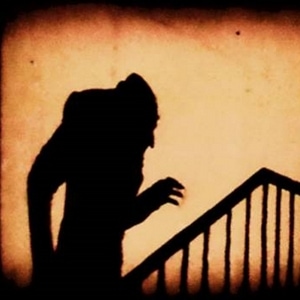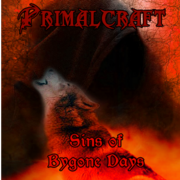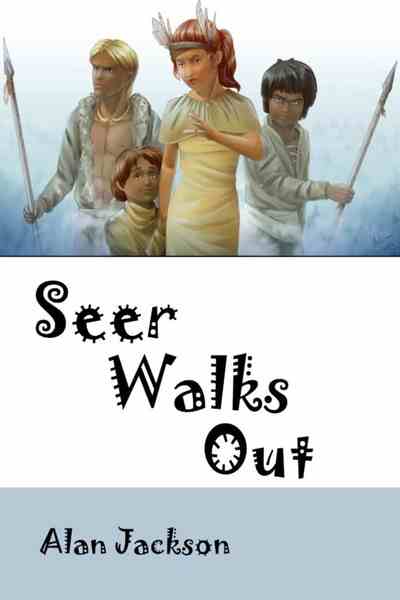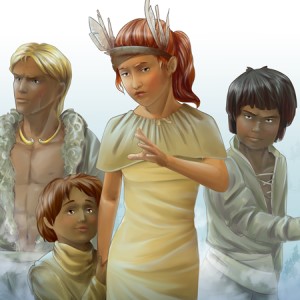We marched on through the woods high above the farm. Hawk and Stack occasionally spoke to each other, but whenever I said anything Hawk spoke across me. When the sun began to fall, I slipped away from them, up the hill. I didn’t think I’d be missed.
It was very steep, but it was good to be in trees – it had been good all day, when I wasn’t noticing Hawk’s snubs. I found a little rocky knoll, surrounded by trees but itself just grass and bare white rock, looking out to the setting sun. I took off my pack and cloak and put them down on my left; then I took off my beautiful dress and shift, and put them down on my right. Then I sat between them, hugging my knees like a little girl. It was bitterly cold, but I didn’t care. I just sat there, as the shivering quietened and ceased.
After a few moments I undid my remaining straps, and put them with the pack and cloak. Now I really was like a little girl, dreaming of making choices of my life. I knew my thoughts were churning uncontrollably, but I floated above them, a naked child, uncommitted, uncaring.
I couldn’t make it last. My thoughts broke through in the end.
Was I a shaman? What is a shaman? A shaman understands people’s bodies, so she can treat their illnesses and control their fertility and so on. A shaman understands people’s minds, so that she can control and direct them into the right paths and heal their hurts and relationships. A shaman understands tribes, so that she can control and advise the chiefs and leaders and make contacts even between enemies. A shaman understands the Spirits, if she believes in them. A shaman understands. And I didn’t understand.
Why didn’t I?
A month ago, when we left the Longwoods, I called myself a shaman. I understood people’s bodies, and I thought I understood people’s minds, but it had never occurred to me to understand tribes.
I looked to my right, at my new clothes. Shouldn’t I accept I could never be a shaman? Shouldn’t I just be a tribewoman – Hawk’s, preferably? I remembered Stack; there’s nothing wrong with being a hunter, but he’d seen himself as Chief. There’s nothing wrong with being a tribewoman, but I’d seen myself as Shaman. Stack couldn’t forgive himself until he realised he could be Champion; for me there was no such alternative.
I looked to my left, at my shaman’s things. Could I become a shaman? Could I start again, learning what it means, learning the basics, until I could do the job properly? Would I ever get rid of the sense of failure, of inadequacy, that I was a girl doing a woman’s job?
The branches behind me stirred. I didn’t look round.
“No,” I said.
“Please – just to protect our camp. You needn’t stay.”
“There are evil spirits in these woods, and some are here around me. I will protect you long enough for you to go away.”
“And the camp?” Stack’s voice had risen an octave.
“Since I am not wanted there, I assume you have your own protection. Now go away.” And I ignored all his protests, until he finally gave up.
I thought about Hawk, and him and me, and then I thought about how he’d behaved in the farm, and how I’d not liked it, and many other little things about him, and then again about him and me together, and about how it would never happen because I was a useless shaman.
And then I floated free again, and wished to stay free.
“Stack says there’s a problem. What’s going on?”
“No problem. Go away.” I didn’t look round at Hawk, either. Why bother?
“Why?”
I didn’t answer.
“Why? Tell me!”
“Why what? Why do I want you to go away? Why am I here instead of in camp? Why did I behave as I did in the farm? Why am I alive?”
“Why did you behave as you did in the farm?”
“How should I have behaved?”
“I don’t know, but–”
“Well, when you know, tell me, and I’ll try to do it next time.”
I heard him sigh.
“I’d just like to understand.”
I didn’t answer.
“I am your Chief. I have a right to be told, at least. OK, no more than that. But I have a right to be told.”
True. “Explain what? Everything? Explain why I poisoned the lad? Explain why I conned the old man into believing he was poisoned? Explain why I ate, and drank, and pissed, and breathed? What?”
There was a long pause.
“I understand everything yesterday. It’s today I don’t understand. And not everything, just when we sat down to finish things.”
“I got it wrong. I’m sorry.”
“Please!”
“I don’t fight children. If we were going to kill the whole family we should have done it the day before. If the father and mother were both killed, the children would die too.”
There was another long pause.
“Was the father telling the truth when he said he was sorry?”
“No.”
“Were you?”
“I never tell the truth.”
“Why did you stop me killing him?”
“Because you wanted to.” That slipped out; I regretted it at once.
I heard him gasp.
“That was the answer you wanted, wasn’t it?” I went on. “No? I’m sorry. I meant, because it would endanger the children. That do? Or would you rather have, because the Spirits forbade it. Or what about, because I feared their ghosts would follow us. Which one would you like? Or something different again? Just tell me, and next time you ask I’ll get it right.”
There was a very long pause, with some heavy breathing.
“Is there a promise I can make, or an oath I can swear, which will mean that you will tell me the truth?”
“You can tell me why you wanted to kill the father.”
That made him think. What I didn’t know was whether he was thinking of the answer, or trying to work out why I’d asked.
“He’d treated us like dirt.”
“He treated us no worse than your father treats you normally.”
“We’re not talking about my father.”
“No?”
“NO!”
“Fine,” I said.
There was a very long silence.
“So why did you stop me killing the father?”
I didn’t answer.
“I said, why did you stop me killing the father?”
“Which father? The father of the family or your own father?”
“We’re not talking about my father.”
“Fine,” I said.
Long silence.
“So,” I said, “you wanted to kill the father because he’d treated you in the way that your own father treats you.”
“Will you shut up about my father! My father’s a great chief! My father’s done great things for the Tribe! I don’t want you talking about my father like that!”
I heard him stamp off.
I floated free on the sunset. A skein of wild geese, the winter-bringers, the far-callers, flighted across from the south, their great V slowly merging with the darkling sky. And I flew with them, floating away from the cold and the shame and the guilt and the wind and the anger and the failure and the trees and the earth, floating into the far sunset, to the islands beyond the sun.
I woke up utterly lost; I was shivering, something was happening to my feet, something else was rough and hot against my skin. Slowly my mind began to switch on; I was wrapped in two cloaks, somebody was rubbing my feet with a handful of twigs, there was a fire nearby.
“Uhh?” I managed.
“Hey, she’s awake!” It took me a moment, but then I remembered the name: Hawk. The foot chafing stopped.
“How’re you feeling?” That was Stack, I was fairly sure I remembered that name. Stack.
I turned my head, and saw two faces looking down at me. They seemed anxious; I couldn’t imagine why.
“You had us really worried there,” Yes, that was Hawk’s voice. “We thought – we honestly thought you’d…” His voice caught.
“That you’d died,” Stack finished.
“Why did you do it, sitting out there in the cold without anything around you? If Stack hadn’t gone to check on you, you would have been dead! You frightened us, truly you frightened us. Don’t do anything like that again, please!”
It took me a quarter of an hour or so before I thought of moving. They’d piled all my things together just by me; I stood up, feeling the warm fire on my skin, then I put on my shaman straps, my new clothes, and my cloak.
“I’m sorry,” I said. “I lost the story, somehow. Is there anything hot to eat or drink?”
“I’m sorry too,” said Hawk. “I should have realised. But you made me cross with talking about my father, so I never thought.”
So it was all my fault really. Thank you, Hawk.
Finally, to please Stack, I danced the boundary of the camp. Or rather, I tried to. It was at this point I discovered a basic problem with clothes: you can’t dance in them. So I had to take the clothes off and dance the boundary wearing just a few leather straps, as a proper shaman should. I doubt if it did anything for the safety of the camp, but it focussed my mind.
“What happened to me must have been the result of an attack by evil Spirits,” I said when I’d finished. “I must have allowed my defences to slip. It is vital that I find out the problem and fix it, or we may all be in danger.”
“You won’t get lost again, will you?”
No, Hawk, tempting as it sometimes is. I seem to be stuck with the pair of you. “No, I’ll be careful. But there is a wider Spirit boundary around this area – I will walk that. I won’t stop in any one place for long.” That should stop them pestering me to see if I’m all right.
I put my cloak on and walked back to where I’d originally left them. Then I traced my steps up the slope to the knoll. As soon as I stepped out of the shelter of the trees the wind was bitter cold; how had I stood it without a cloak? And why?
I didn’t stop. I climbed on up the slope, and then contoured north. It was very hard going. I stopped for breath between two oak trees, in a patch of tumbled boulders.
So, shaman or not? I’d left my clothes behind, and I was just wearing my tribal gear – leather straps and cloak. Had I already chosen?
Now I was no longer freezing myself to death, other issues crept out.
First, a shaman can never be hand-pledged to a man; nothing must be allowed to come between her and the Spirits, and nothing must be allowed to bias her advice and judgement. So I could never be hand-pledged – to choose an utterly random example – to Hawk. Yes, I could have sex with him; yes I could bear his child; yes we could be friends; but he would never be joined to me. I would have to watch him take other women to his tent, and be happy for him.
Second, this party needed a shaman. Yes, I had failed in practice, but I had managed to sell the idea that they needed a shaman. To Stack, certainly, but to Hawk as well; I didn’t believe he fancied me – I’d failed there too, and anyway there was the Valleys girl; I never stood a chance – and yet he’d worried about my dying of cold. They needed a shaman, however incompetent.
I faced all these things, but I couldn’t understand and I couldn’t decide. I worked my way down the slope, still moving northwards, until I reckoned I was about level with the knoll; the view through the trees westwards was about right. The Evening Star shone between the branches, a lonely glory among the dull stars around her. I reached out to her, and then inside myself. I found strength there; and I decided.
I would not be told what to choose. Not by my Chief, not by my Tribe, not by my mother, not by my friends, not by my mistakes, not by my fears, not by my needs, not by my lusts, not by my body, not by my heart. I would choose.
I chose to be a shaman.
The moment I said that, I understood. By choosing, I had taken power over myself. Not my Chief, not my Tribe, not my mother, not my friends, not my mistakes, not my fears, not my needs, not my lusts, not my body, not my heart. I had power over myself. And in the end, what other kind of power is there?











Comments (0)
See all